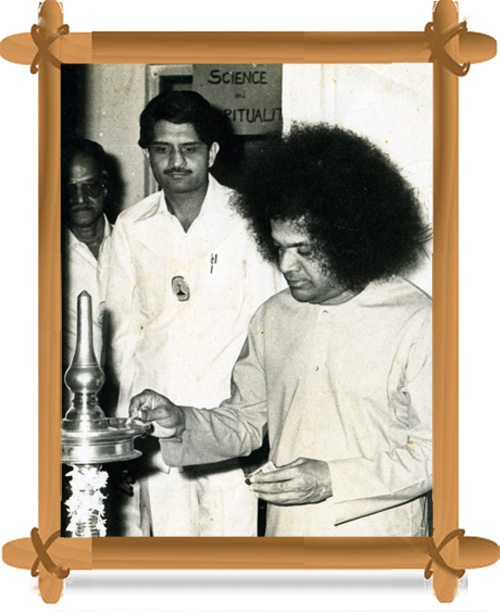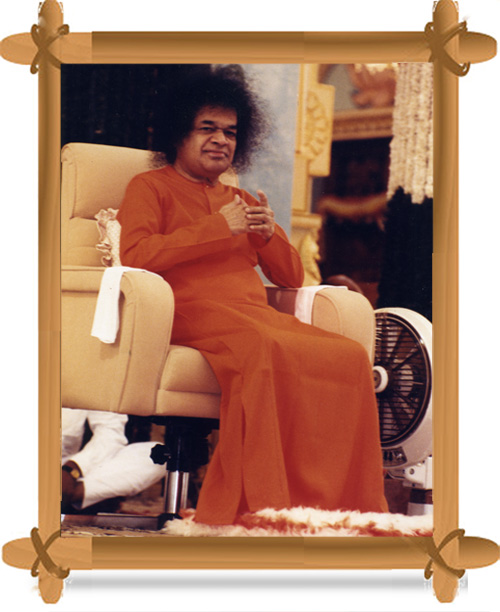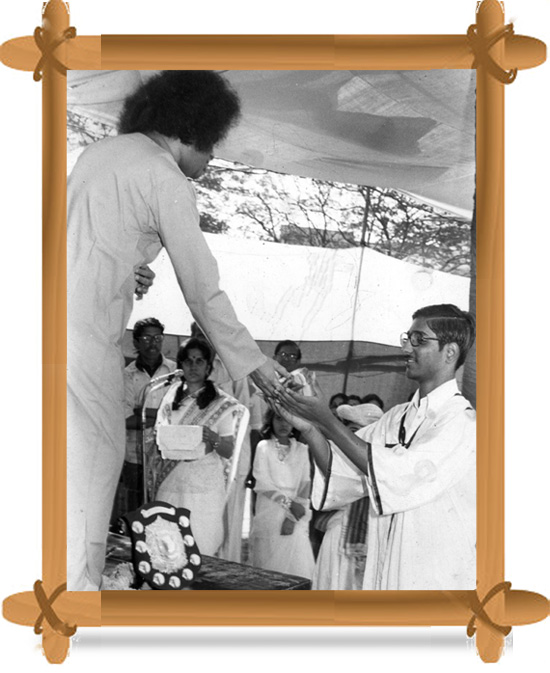|
|
| 'Like' us on Facebook | Follow us: |
Posted on: Apr 03, 2013
Law, love & life:
Learning it all from the lord
Conversation with Mr. Nimish & Mrs. Kamala Pandya
Part - 2
KM: During the ceremony in the interview room, did he give you any advice on how to work out an ideal marriage?
NP: Going by His usual practice, the previous day Swami called Kamala, her mother and my mother and gave them a sari each Usually, Swami also gives the groom a dhoti before the wedding day, but when it came to me, he refused to do so. Intrigued, my mother even went and asked Him why he did not give her son a dhoti when He gave the bride a sari. To that, Swami said, “Well, your son does not know how to wear a dhoti, he feels uncomfortable and so there is no point giving one to him.” He went on to say, “You see, if he does not wear it properly, the dhoti will come out and that will be very shameful, won’t it?”
 |
 |
 |
 |
 |
 |
 |
 |
| Mrs. Kamala Pandya offering a garland to Bhagawan | |||||||
KP: I must tell you that His words were linked to what we once said to each other in a cab while traveling together in Mumbai.
NP: Yes, the reference was amazing. Just showed how omnipresent Swami is.
KP: When you travel in a cab in Mumbai, you always have flower vendors asking you to buy a gajra. I had short hair, and every time a vendor would say, “Saab, memsaab ke liye phool le lo”(Sir take flowers for Madam), he would say, “Baal nai hai phool kahan lagatha (where is the hair to put flowers in)?”
NP: I used to chide the guys, “Little chap! She has got such short hair, where will she put the flowers?” The other conversation was related to my dhoti. Instead of the typical Gujarati lungi, I used to wear night suits - blue pyjamas and blue kurta. And, she would tease me saying if I ever wore a lungi, it would fall off and that would be shameful.
KP: And, Swami used the same words in that interview just before we got married.
NP: So, when my mother asked him why He wasn’t giving me a dhoti, He said, “No point, if the dhoti falls off, it would be shameful.” And, He said those words looking directly at Kamala. Then, next day, on the day of the wedding, as we all entered inside, He was looking at me as if implying, ‘This is the guy who had sworn never to marry in life, and who wanted to be free’. Swami then put His hands on both our heads and recited the slokas. Although we didn’t know Sanskrit, we could feel the vibration of the pure blessings we were receiving. At the end of the ceremony, Swami presented us with His gifts. He took out a mangala sutra (sacred wedding medallion worn by married Indian women).
 |
|
Bhagawan lights the lamp of wisdom at an Exhibition on Science and Spirituality at Dharmakshetra |
KM: How did you feel when Swami did that?
NP: I must confess that as a lawyer, I have a rational bent of mind and would question everything. Whenever Swami would materialise such articles, I always thought that there was some trick involved. I mean, I could understand the phenomenon of vibuthi, but could never figure out how He manifested things like a gold chain, ring, and mangala sutra. That morning, on our wedding day, I was sitting right at His feet when He did a typical rolling-up-the-sleeves kind of action and then took the whole hand out and hit me – and the mangal sutra fell out.
KM: Wow!
NP: With a twinkle in His eyes, He looked at me and said, “Hold it now, and put it round her neck.” I did as was told and we were all in complete awe over what had just transpired. But it did not end there. Swami then brought out a ring. I must say that there was still some 10% doubt in my mind about how He managed to do these things. Anyway, Swami took out the ring and gave it to Kamala, telling her to put it on my finger. The ring was lovely but it didn’t fit me. It was the wrong size. It got stuck halfway on my finger.
KM: With your sense of doubt, you would have been assailed by conflicting thoughts then?
NP: True. While I was elated that Swami had given me a ring, I had this nagging thought at the back of my mind that something was amiss, and how could Swami go wrong with the size. A lot of thoughts passed through my mind. Of course, I didn’t have the courage to open my mouth and say anything. And then, Swami gave us a thoughtful lesson.
KM: About marriage?
Invaluable Lessons on Marriage from the Divine Himself
NP: He told us this humorous story about how love fades between a couple. I am sure you would have heard Swami narrate this.
KM: Please share it with us for the benefit of Radio Sai listeners/readers.
NP: According to Swami’s story, In the first few years of marriage when a couple is walking on a road and there is a stone some 20 yards away, the husband would say, “Darling, be careful, watch the stone.” After a few years of marriage, in a similar situation, he would say, “Can’t you see, there is a stone there?” You know how Swami narrates this story in his descriptive style! After He said this, Swami imparted an important piece of wisdom, which has stayed with us through all these years. It’s the advice that He used to give every married couple - that marriage is something that you have to build upon.
It is a relationship where two people must first understand each other and then adjust with each other if they are to strike a strong bond between them. He said the mistake most people make is - they try to adjust without going through the initial process of understanding each other.
 |
He went on to say that marriage is a conjunction of two souls and not only bodies.
KM: An analogy that can be compared to the camphor pieces while doing Arathi.
NP: That’s right, and that’s the same reference that Baba made during our wedding. When the mangal arathi was being performed, for the first time I saw Swami as a perfect carom player. He hit one piece of camphor as you would strike a coin in a carom board, and it glided to merge with the other and become one. Swami then turned around and said, “Dekha! shaadi se pehle do. Shaadi ke baad one” (See, before marriage it is two but after marriage it is one). It is a union of two souls.
KM: Amazing piece of marriage counselling, I would say.
NP: Swami’s concept of marriage is very traditional. He believes that marriages are fundamental to leading and creating a good society. He has always said that family as a unit is vital and all societies that are built on the foundation of strong families will survive. And, that’s what He wanted India to become, that’s what He wanted our society to become. Earlier, I have often wondered why Swami encouraged marriages or why He would personally perform marriages etc. Over time, I have realised that Swami wanted all husband-wife teams and families to be strong. He wanted the world of Sai to be based upon the family as a unit. That was probably why He encouraged everybody to marry.
KM: Going back to your wedding day, you said the ring that Swami gave did not fit. What did He then do about it?
NP: When the solemn and beautiful wedding ceremony came to an end, Swami continued to be in a playful mood. He came to me and said, “Tumhara ring kaisa hai (how is your ring)?” Very belligerently, I said, “Swami! It’s a wrong size, it is not fitting me.”
He then said, “Accha, it’s a wrong size?” He picked up the ring in His hand and what followed was a spectacular miracle. Despite all my determination not to regard it as miracle, I was forced to be witness to one. Swami picked up the metal ring that had a lovely crystal – as brilliant as a diamond. In front of my eyes, just six inches away, He bent the whole metal and blew on it. In an instant, one stone split into two in front of my eyes. And then Swami said, “Abhi daalo” (wear now).
KM: Incredible.
NP: He put it on my finger and said, “Ithna perfect match tho koyi goldsmith bhi thumko nahi dega” (even a goldsmith can't give you such a perfectly matched size). And that ring was so amazingly beautiful, I was literally dumbstruck with awe.
KM: What were the two stones?
NP: They were like two diamond studs. I think Dr. Safaya and I are the only two people who were given such a ring. They were so heavy that the finger would feel weighed down. I was naturally overjoyed. But then came the anticlimax. Swami surprised me by saying, “Accha hai, sambhaalke rakhna, but ek din thum ghuma dega” (It is good, keep it safely but one day you will lose it).
KM: He said you would lose the ring?
NP: Of course the young man in me didn’t take His word seriously. I was complacent that an exceptionally careful person like me would never lose such a precious ring. I wore that ring for several years.
KP: Only on important days though…
 |
 |
 |
 |
 |
 |
 |
 |
NP: I would wear it when I would have a hearing in the court. I remember when I used to argue with that ring on my finger, the judges sitting on the bench would stare at it. They would even call me after the session and ask, “What is that ring, Mr. Pandya?” Their curiosity was justified. I was young, not really a flourishing lawyer then, and to be seen wearing such an obviously expensive ring was quite an incongruity.
KM: Do you have that ring with you? Or, is it lost as Swami had predicted?
NP: During our travel to the US enroute Singapore, I went to the washroom to wash my hands. I took out the ring, washed my face and stepped out of the washroom. Within a split second, I realised I had left my ring back and rushed inside but the ring had disappeared. Swami had foreseen this moment of course. I take consolation in the fact that Swami knew I never had a fascination for jewellery. Ever since I can remember, I have resisted wearing chains and rings. So, Swami decided to give me some joy but took it away because He knew that it wasn’t for me.
KP: May be the seven year itch between us was over by then and He felt we didn’t need the protection anymore. (laughs)
NP: That could be right. I remember Kamala telling Swami about the lost ring and He asked her not to worry as I didn’t have any further need for it.
Love for Him is the Bond that Binds and Keeps Them Together
KM: Speaking of a husband and wife team being united, both of you have consistently remained committed to the Sai Organisation, the Sai Mission. How do you remain so inspired all the time?
NP: Swami made us understand how one must live life between the period of birth and death. Much of it has to do with the joyful knowledge that God is within you and the realisation that God can be experienced through the medium of the organisation. We need to remember that God is not anywhere out there in the world, not anywhere in other dimensions of life. God is within us. When Swami says He is everywhere, the challenge is to understand the implication of His words in entirety.
KM: So, how did you adopt this truth to your life?
 |
|
The first Sri Sathya Sai Bal Vikas Group III Convocation at Shivaji Park, Mumbai |
NP: Throughout Kamala’s association with Bal Vikas and my association with the Sai organisation, we would feel His presence everywhere and in everyone. The moment you make His words the objective of your life - that He is in you as much as He is in everybody else - then life becomes very interesting; everything that you do becomes very interesting.
KM: Could you take us deeper into this line of thought?
NP: Let me put it in three parts. In today’s world, for two educated intelligent people to live together in harmony is quite a challenge, not easy by any means.
KM: Especially when both are lawyers, capable of arguing their point very well!
NP: Both lawyers…..now.
KP: That’s right. I wasn’t a lawyer when I got married to him; Swami made me one. He kept saying, “I know you don’t like it, but you have to do this for your husband’s sake.”
NP: Swami mandated her to help me.
But the point I am trying to make is that both of us realised at every stage that although we are two different personalities, two different bodies, two different forms, somewhere down the line there is an oneness with Swami’s presence. His presence is a factor that enthuses you to live life in full and in harmony.
KM: And, the other two factors you mentioned?
NP: Remember we are from two different cultures, so there is plentiful scope for conflicting mind-sets.
In fact, when Swami was asked, “Are you against marriages of different castes and creeds?”, Swami said, “I am not against marriages but what I tell people is that cultures are different therefore adjustments will be very difficult”. So, Swami was never against inter-caste marriage. However, Swami had some measure of diffidence as it proves difficult for the couple and their families to understand and adjust.
But in my case, as our match was made by Him, the bond between her brothers and her sisters and my parents became very strong despite the Sindhi – Gujarati differences. This is the second factor where I realised that Divinity can play a great role and Divinity can be experienced in day-to-day life. Thirdly, as we moved further into professional life, I found that Swami was there all along in my profession, in my office, in my courts, everywhere - an integral part of our lives.
KM: Could you please elaborate on this aspect?
NP: Both of us were associated with the Sai Organisation. And, as you would know, the lifestyle of a lawyer in Mumbai is hectic, you are on call round the clock. The adage, “The law is a jealous mistress. It doesn’t even tolerate your wife” is completely true. It’s been nearly 35 years now, and Swami has blessed me with more success than I could have ever asked for – to an extent that even when I am on vacation, people are prepared to wait for me to return and take up their case.
KM: How do you feel Swami’s presence when you are practicing in court?
NP: Whenever I am in a tricky situation, words like ‘Om Sai Ram’ or ‘Swami take care’, ‘Swami look’ immediately changes the mind-set of the judge and sometimes even that of the opponent. When you experience Swami in day-to-day life, you yearn to continue feeling that enthusiasm. And, as Swami says, at the end of life, when you close your eyes and bid your last, you want to feel His presence.
KM: So well said.
NP: And, when you feel that joy, you want to share that joy. That’s the enthusiasm you feel.
KP: Personally, for me, the inspiration to become a Bal Vikas teacher came because I found that I could change myself first. I am by nature a perfectionist, I can’t do anything slipshod. No cutting corners or compromises work for me. Whether it is a Bal Vikas class or taking an eighth standard math lesson or whatever, I must excel. This attitude must have been with the grace of God, the reason for getting two gold medals. So as a Bal Vikas guru, preparation is key and I make sure the classes are all planned ahead.
 |
 |
 |
 |
 |
 |
 |
 |
Swami with the Bal Vikas children of Maharashtra |
|||||||
KM: You still conduct Bal Vikas classes?
KP: I have been teaching Bal Vikas for almost 30 years. From not knowing any Sanskrit, I worked on learning the mantras through consulting with friends and practicing the pronunciation with them.
All this has enriched me as a person. Truthfully, I think I have benefited more than the children themselves through these classes!
KM: Was it hard to go back to Law School after marriage and start a demanding professional life?
KP: In my class at the law college, we had 150 enrolled students. Strangely though, I was the only student who would show up every day for the morning class from 7 – 10am. It would be just the professors and me. I opted for this early class as Swami had instructed me to help my husband in the office. The afternoons were therefore set aside for office work. After the second year at college, I could practise in the office itself. Thankfully, my photographic memory helped me pick up the lessons fast. All I needed was one read to be able to reproduce the text verbatim. In that sense, my study at the law college was a cakewalk for me.
KM: And, another gold medal in your kitty?
KP: At the time of my exams, my in-laws were in Puttaparthi. And, Swami would repeatedly ask them, “Daughter-in-law ka law exam ho gaya? Daughter-in-law ka law exam ho gaya (Is the daughter-in-law's law exam done)?” When the results were declared, I knew that I had secured a first class but had no idea that I was also on the gold medal list. A month later, I received a letter by mail saying that I had been awarded the gold medal. I immediately sent a telegram to Bhagawan informing him of the same. I believe Swami came out on the portico and told my father-in-law, “Dekha? Daughter-in-law ko gold medal ...achha nai lagtha tha law, lekin gold medal leke aya na?” (See, your daughter-in-law secured a gold medal in her Law program even though she did not like Law).
Although I had made Swami proud, I don’t think I was as happy on a very personal level because I could never identify myself with anything that had to do with arguments or ‘verbal fighting’! Anything that caused a disturbance in the vibration did not go down well with me.
 |
 |
 |
 |
 |
 |
 |
 |
Bhagawan blessing and releasing a compendium of articles by All India Bal vikas Alumni, 21 July 2010 |
|||||||
KM: The legal profession is just the antithesis of what you say.
KP: In this profession, it’s common to find people shouting and screaming. Knowing my dilemma, Swami told me, “You help in the office; take care of the documentation part”. Thankfully, we have struck a balance here. My husband takes the responsibility of representing our clients in the court, while I provide all the back office support.
NP: She is indeed a huge support. In fact, how this arrangement came about also has a humorous story attached to it - crafted by Swami of course. The study of law is a three-year programme.
KP: During the course of those three years, whenever we came to Puttaparthi, Swami used to walk on the sands and ask me, “How was the first year result?” I would tell him it went good or very good, depending on my performance. This went on semester after semester. After the final exams got over, I remember Swami came out from the room when it was drizzling, and unmindful of getting wet asking me with childlike eagerness, “Ho gaya exam? Pass ho gaya?(Are your exams over? Have you passed?)” I said, “Ha Swami! Ho gaya pass (Yes Swami! I have passed”. Swami went on to ask, “Wife ka result aagaya (Has the result of your wife's exam come)?” I said, “Ha, Swami! Pass ho yaga (Swami she has passed the exam)!”. And then, Swami said, “Pass ho gaya? Very good! abhi roj jagda.” (ok since wife has passed the exam, now fight daily). Ha, ha ha! (laughs)
KM: Swami’s signature humour!
Both of you are successful and committed lawyers. How do you strike a balance between home, work and Sai duties when most people find it almost impossible? Some get stuck in one rut and are unable to think beyond that.
NP: Between the two of us, we make sure one of us attends to the business while the other continues to carry on the Sai duties. But such situations are rare, so we are able to set aside weekends (Saturdays and Sundays) for Sai work without too much of a problem.







